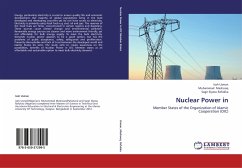Energy, particularly electricity is crucial to ensure quality life and economic development. But majority of global populations living in the least developed and developing countries yet do not have access to electricity. Electricity is primarily using fossil fuels e.g coal, oil and gas. The reserves of the fossil fuels are finite, concentrated in certain regions and depleting. These sources cause climate change and environmental pollution. Renewable energy sources are cleaner and more environment friendly, yet not affordable for bulk energy supply. To meet the bulk electricity demands nuclear power appears to be a good option, but has the problems of public acceptance, safety, safeguards and proliferation. Presently Islam-phobia and lack of trust between the developed world and Islamic States do exist. The study aims to create awareness on the possibilities, benefits of Nuclear Power in OIC Member states as an affordable and sustainable option to meet bulk electricity demand.

